Archive
21 May 2021
Scientists overhear two atoms chatting
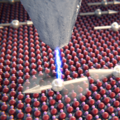
How materials behave depends on the interactions between countless atoms. You could see this as a giant group chat in which atoms are continuously exchanging quantum information. Researchers from Delft University of Technology in collaboration with RWTH Aachen University and the Research Center Jülich have now been able to intercept a chat between two atoms. They present their findings in Science on 28 May.
17 May 2021
New research shows: Antoni van Leeuwenhoek led rivals astray
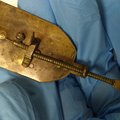
A microscope used by Antoni van Leeuwenhoek to conduct pioneering research contains a surprisingly ordinary lens, as new research by Rijksmuseum Boerhaave Leiden and TU Delft shows. It is a remarkable finding, because Van Leeuwenhoek (1632-1723) led other scientists to believe that his instruments were exceptional. Consequently, there has been speculation about his method for making lenses for more than three centuries. The results of this study were published in Science Advances on May 14.
10 May 2021
Physicast with Roel Smit

The first episode of the Physicast is online: the podcast for and by all those who have something to do with the world of Applied Physics. Listen to it during your relaxing walk or on the couch! In this episode, Annelot has a conversation with Roel Smit
06 May 2021
Researchers discover how a cell’s armour can be both flexible and strong
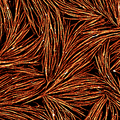
Medieval knights either had thick, cumbersome armour, or they could wear less protective armour and be flexible in combat – they couldn’t have both. Cells, on the other hand, do have it all. Researchers from Delft University of Technology (TU Delft), Leeds University, Institut Fresnel in Marseille, and Institut Curie in Paris discovered that proteins called ‘septins’ reinforce the fragile membrane of a cell, while still being flexible enough to allow the cell to change shape.
29 April 2021
Researchers create living material based on algae
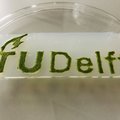
Researchers led by Delft University of Technology (TU Delft) used 3D printing to create a novel, environmentally-friendly and living material made of algae that has many potential applications.
26 April 2021
Royal Honors for three TU Delft professors
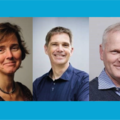
De Delftse hoogleraren Pieternel Levelt, Jack Pronk en Kees Vuik hebben dit jaar een Koninklijke Onderscheiding ontvangen.
20 April 2021
Dome plating RID
RID's dome is getting a makeover, in the form of new dome plating. How are things going with this cosmetic operation? Project leader Simone Janssen gives us an update in this video. Don't forget to enable the subtitles!
14 April 2021
Chirlmin Joo receives VICI grant for identifying proteins one at a time
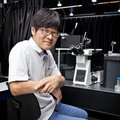
Researcher Chirlmin Joo of TU Delft will receive a VICI grant for developing a method to sequence proteins one at a time. He will receive 1.5 million euros from the Netherlands Organisation for Scientific Research (NWO).
13 April 2021
Investment from Growth Fund gives Zuid-Holland economy a big boost
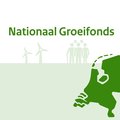
Zuid-Holland's economy and knowledge and innovation infrastructure will be strengthened thanks to investments from the National Growth Fund announced today by the demissionary government. The money will go towards improving accessibility, Health, Quantum, Green Power and Artificial Intelligence.
07 April 2021
Using molecular sieves to adjust the taste of non-alcoholic beer
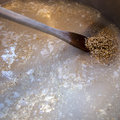
Researcher Deborah Gernat has created a new method to further develop the taste of non-alcoholic beer, in collaboration with Heineken. The technique, which is based on molecular sieves, gives brewers a new tool to bring the taste of non-alcoholic beer closer to that of regular beer. The first tests showed that the sweet 'wort taste' that often characterizes alcohol-free beer can be reduced using this method. On April 9th, Deborah Gernat will receive her doctorate on this subject at Delft University of Technology (TU Delft).